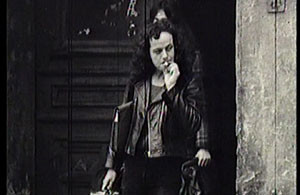Klipzensored
08 - 21 Oct 2007
KLIPZENSORED
// Eröffnung/Opening 7. Oktober 2007, 19:00 mit DJ Selecta PEhLE
// Ausstellung/Exhibition 8.10. – 21.10.2007,
// Öffnungszeiten tgl./ opening times daily 12:00 - 19:00
// Zutritt ab 18 Jahren / Entrance only over the age of 18
Banned! Censored! Confiscated! This is what we often associate with art and culture from the so-called "East Bloc" and this also applies to music clips and other forms of audiovisual presentation of popular music. Completed films and/or scripts usually had to pass through some forms of state control (broadcasting supervisory boards, cultural institutions etc.) that evaluated the works' political and moral appropriateness before they could be shown on TV music programs or in cinemas, youth clubs etc. Whatever didn't conform to the system, that is what was "morally objectionable", counterrevolutionary, without class consciousness or often merely critical, was not shown. Or pulled out of circulation after the fact as soon as possible, as was the case in some countries when certain artists were banned or became "non-persons" after emigrating or being expelled.
After the dissolution of communism – although free media were introduced at least nominally – certain music clips came under fire by state run and now private (editors of music TV stations and music shows on commercial TV) control mechanisms. Many clip makers were/are tempted to test the limits of what is acceptable and sometimes purposefully violate transgress those limits. When pop songs in general violate political, sexual or religious taboos, this is already cause for alarm. All the more so when already provocative lyrics are visualized or otherwise innocuous songs are coupled with taboo breaking visuals.
The KLIPZENSORED exhibition presents music clips and music based short films/video art that for various reasons weren't shown in mainstream media (TV, cinema, venues like youth clubs) of their countries of origin or, if at all, only in censored form or at certain times of day. Many presented works are seldom seen clips from television, film and private archives – from acts such as Wolf Biermann, Klaus-Renft-Combo, Freygang, AE Bizottság, Kontroll Csoprt, Rammstein and Tankcsapda. The clips are complemented by interview statements by clip makers, musicians, state broadcasting employees, music television staffers and youth protection officials.
The clips and statements are presented on vintage TV sets from the respective eras in which the clips were made. Documents, photos, posters etc. provide additional information and context. This includes material that due to yout protection regulations is only accesible for visitors over 18 years of age.
Hungary and the GDR and post-1990 Germany are the focus countries. This allows a comparison between a more open Socialist society and a repressive one and serves to counter a somewhat monolithic preconception of Socialism in Central and Eastern Europe while examing different forms of censorship. The exhibition doesn't end with the momentous events of 1989/90 but continues to the present day to highlight current debates about freedom of expression versus political correctness, as most recently exemplified by the controversy over racist and homophobic rap songs.
// Eröffnung/Opening 7. Oktober 2007, 19:00 mit DJ Selecta PEhLE
// Ausstellung/Exhibition 8.10. – 21.10.2007,
// Öffnungszeiten tgl./ opening times daily 12:00 - 19:00
// Zutritt ab 18 Jahren / Entrance only over the age of 18
Banned! Censored! Confiscated! This is what we often associate with art and culture from the so-called "East Bloc" and this also applies to music clips and other forms of audiovisual presentation of popular music. Completed films and/or scripts usually had to pass through some forms of state control (broadcasting supervisory boards, cultural institutions etc.) that evaluated the works' political and moral appropriateness before they could be shown on TV music programs or in cinemas, youth clubs etc. Whatever didn't conform to the system, that is what was "morally objectionable", counterrevolutionary, without class consciousness or often merely critical, was not shown. Or pulled out of circulation after the fact as soon as possible, as was the case in some countries when certain artists were banned or became "non-persons" after emigrating or being expelled.
After the dissolution of communism – although free media were introduced at least nominally – certain music clips came under fire by state run and now private (editors of music TV stations and music shows on commercial TV) control mechanisms. Many clip makers were/are tempted to test the limits of what is acceptable and sometimes purposefully violate transgress those limits. When pop songs in general violate political, sexual or religious taboos, this is already cause for alarm. All the more so when already provocative lyrics are visualized or otherwise innocuous songs are coupled with taboo breaking visuals.
The KLIPZENSORED exhibition presents music clips and music based short films/video art that for various reasons weren't shown in mainstream media (TV, cinema, venues like youth clubs) of their countries of origin or, if at all, only in censored form or at certain times of day. Many presented works are seldom seen clips from television, film and private archives – from acts such as Wolf Biermann, Klaus-Renft-Combo, Freygang, AE Bizottság, Kontroll Csoprt, Rammstein and Tankcsapda. The clips are complemented by interview statements by clip makers, musicians, state broadcasting employees, music television staffers and youth protection officials.
The clips and statements are presented on vintage TV sets from the respective eras in which the clips were made. Documents, photos, posters etc. provide additional information and context. This includes material that due to yout protection regulations is only accesible for visitors over 18 years of age.
Hungary and the GDR and post-1990 Germany are the focus countries. This allows a comparison between a more open Socialist society and a repressive one and serves to counter a somewhat monolithic preconception of Socialism in Central and Eastern Europe while examing different forms of censorship. The exhibition doesn't end with the momentous events of 1989/90 but continues to the present day to highlight current debates about freedom of expression versus political correctness, as most recently exemplified by the controversy over racist and homophobic rap songs.

